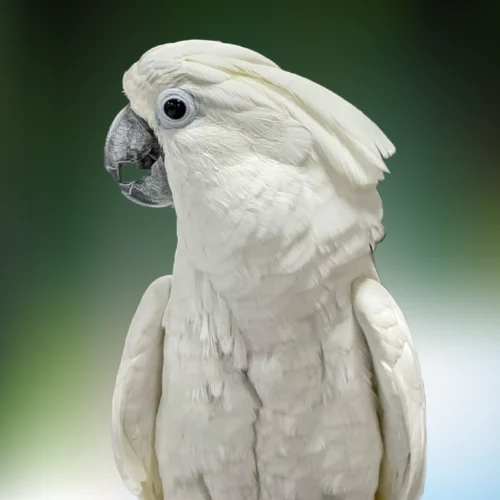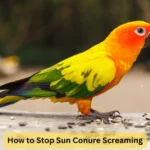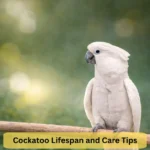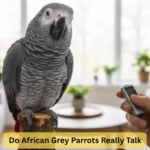
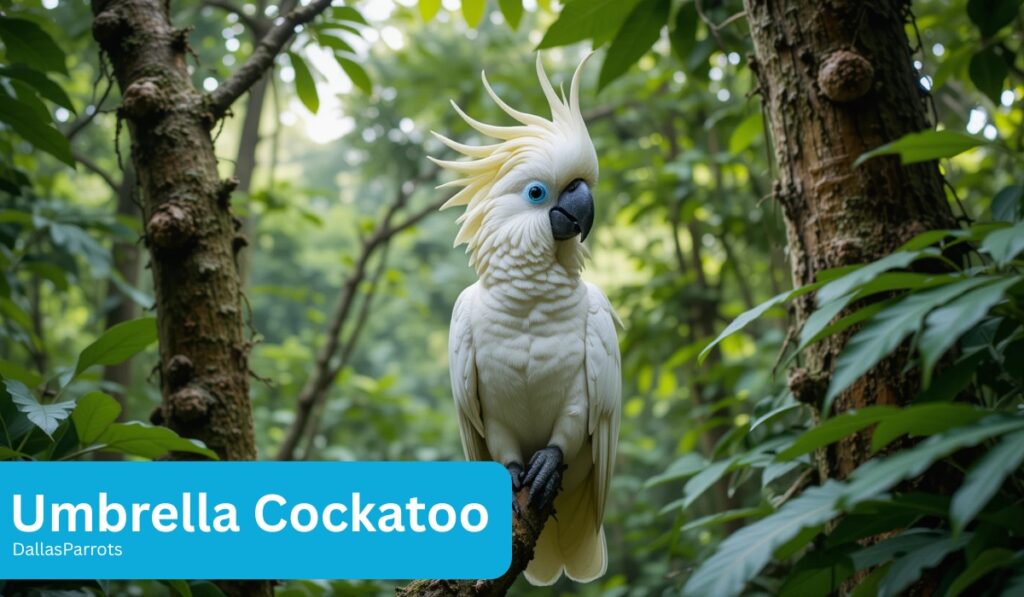
Umbrella Cockatoo Price, Lifespan, Care & Complete Guide
Umbrella Cockatoo is a stunning, large white parrot native to the tropical rainforests of Indonesia, particularly the islands of Halmahera, Bacan, and Ternate. It gets its name from the impressive crest on its head, which fans out like an umbrella when the bird is excited, surprised, or seeking attention. This crest, along with its snow-white plumage, black beak, and piercing dark eyes, makes it one of the most visually striking parrots in the world. In the wild, they are often seen in pairs or small flocks, socializing in the canopy and feeding on seeds, fruits, and nuts.
Umbrella Cockatoos are incredibly smart and deeply emotional birds that thrive on strong connections with their human families. Known for their playful nature and sweet temperament, they crave affection and love being part of your daily life. Many owners compare their emotional needs to those of a toddler, as they demand daily interaction and mental stimulation.
Their ability to mimic human speech and sounds adds to their appeal. But their volume and strong personalities also mean they’re best suited for experienced bird owners. This bird isn’t just a pet—it’s a long-term emotional commitment that requires time, consistency, and understanding.
Buy Our Charming Umbrella Cockatoo at Dallas Parrots
If you’re looking to welcome a loving and playful companion into your home, our Umbrella Cockatoos are the perfect choice. These affectionate birds not only bring joy with their expressive crests and beautiful white plumage but also thrive in environments where they receive plenty of attention and care. At Dallas Parrots, we ensure that each cockatoo is healthy, well-socialized, and ready to become an integral part of your family.
What Are the Characteristics of the Umbrella Cockatoo?
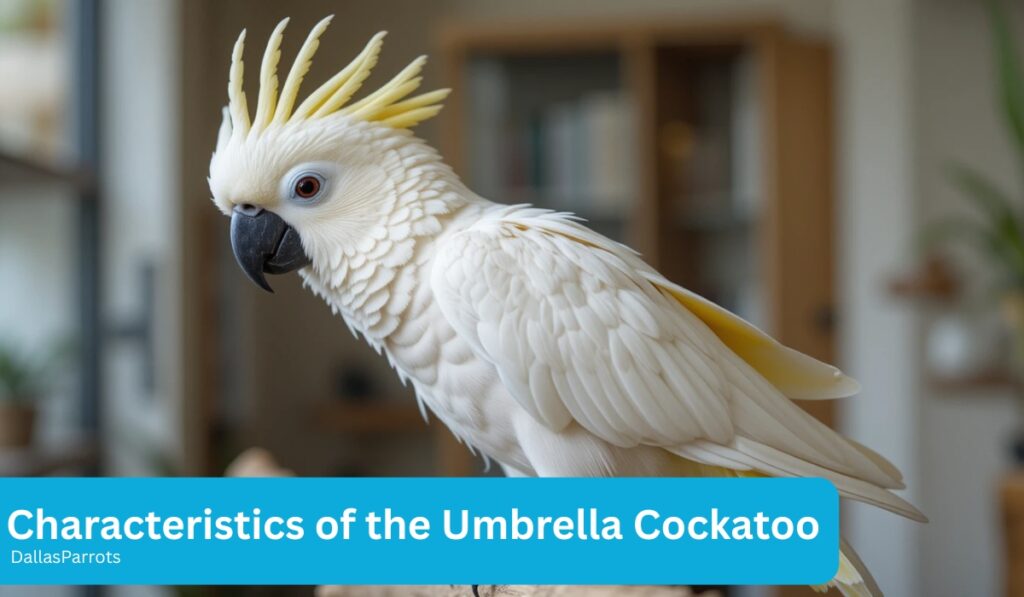
Umbrella Cockatoo is a striking and affectionate bird that hails from the Indonesian islands of Halmahera, Bacan, and Ternate. Known for its expressive crest that fans out like an umbrella, this bird is easily recognizable by its predominantly white feathers, with soft lemon-yellow accents under its wings and tail. These parrots are not just visually captivating but also come with a warm, sociable nature, making them popular pets. Their size reaches up to 18 inches, and they weigh around 700 grams, providing ample room for play and interaction. Their dark gray beak and feet contrast beautifully against their white plumage, adding to their aesthetic charm.
Lifespan and Long-Term Commitment
Umbrella Cockatoo, with its affectionate and playful personality, can live a remarkable lifespan of 40 to 80 years when given the right care. This exceptional longevity makes the decision to adopt an Umbrella Cockatoo a lifelong commitment, far beyond the typical duration of many other pets. These birds are not just companions; they are a commitment for life, requiring consistent attention, dedication, and care throughout their years.
Why the Lifespan of an Umbrella Cockatoo Matters
Owning an Umbrella Cockatoo is a significant responsibility due to their long lifespan. The commitment is more than just about the immediate needs of the bird; it spans decades. Potential owners must understand the implications of this long life and prepare for the emotional and financial investment that it entails.
- Emotional and Social Commitment: These birds form deep, lasting bonds with their owners. Due to their high level of intelligence and social skills, umbrella cockatoos require ongoing mental stimulation, engagement, and care. Without regular engagement, they can develop behavioral issues, such as depression or anxiety, and may resort to destructive behaviors, like excessive screaming or feather plucking.
- Financial Consideration: Long lifespan also means that owners will need to plan for long-term financial care. This includes the cost of food, regular veterinary care, cage maintenance, and purchasing new toys to keep them stimulated. Over the course of their life, these expenses can add up, requiring ongoing attention to both their health and well-being.
- Health and Veterinary Care: Throughout their lives, birds must have routine examinations with a veterinarian.As they age, health challenges may arise, such as joint issues, heart disease, or obesity, all of which require specialized care. Preventative health measures, including a balanced diet, vaccination, and parasite control, are crucial in prolonging their health.
- Lifestyle Adjustments: Commitment doesn’t end after adopting the bird. You may need to adjust its environment, its diet, or its exercise routine. Long-term owners must be flexible and ready to adapt to these evolving needs, ensuring the bird remains content and healthy for its entire lifespan.
Personality, Diet, and Housing of Umbrella Cockatoos
| Category | Details |
| Personality and Behavior | – Known for affectionate and playful nature. – Forms strong bonds with owners. – Can become distressed if neglected. – Requires regular mental stimulation to avoid behavioral issues. |
| Diet and Nutrition | – Diet should include high-quality pellets, fresh fruits, vegetables, and occasional nuts. – Avoid feeding avocado, chocolate, caffeine, and alcohol as these are toxic to birds. |
| Housing and Environment | – Needs spacious cages to accommodate their size and activity level. Make sure the cage includes a few perches and some toys to keep your bird engaged, and place it in a bright, airy spot—away from any cold drafts or direct wind – Regular out-of-cage time is necessary for their well-being. |
Social Interaction and Training
Umbrella Cockatoos are highly social birds that thrive on interaction with their human companions. They are not independent birds and require constant attention to stay mentally and emotionally healthy. Regular interaction with your cockatoo is essential for building a trusting relationship. This includes engaging them in daily training sessions, providing playtime, and offering opportunities for socialization.
Training an Umbrella Cockatoo
Training an Umbrella Cockatoo requires patience, consistency, and an understanding of their intelligent nature. These birds are quick learners and can be taught a variety of tricks, behaviors, and even basic commands. However, it’s important to keep sessions short and engaging to prevent them from becoming bored or frustrated. This not only strengthens their bond with you but also provides them with the mental stimulation they need to avoid behavioral issues like destructive chewing or excessive screaming.
Playtime and Socialization
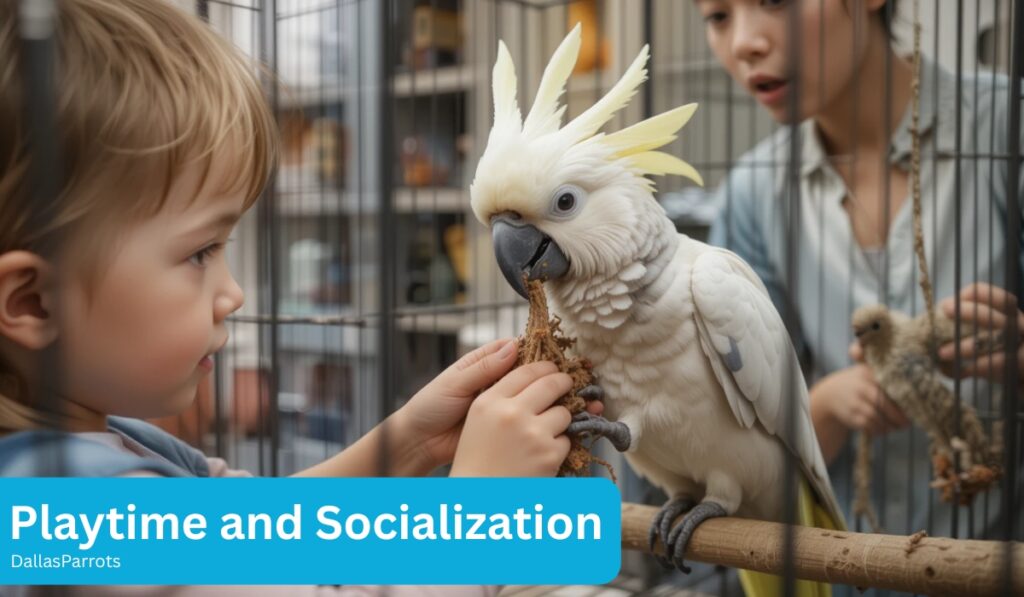
Its just as important as training. Playtime helps your Umbrella Cockatoo burn off excess energy while also providing opportunities for learning. This can include time outside the cage, where the bird is free to explore and engage with different toys and activities. Socializing with new people, environments, and even other birds can also help your cockatoo develop a well-rounded and friendly personality.
Positive Reinforcement
Positive reinforcement is the most effective training method for Umbrella Cockatoos. They respond well to praise, treats, and attention when they perform desired behaviors. For example, when teaching them a trick or good behavior, rewarding them with a small treat or verbal praise reinforces that action and encourages them to repeat it. Using positive reinforcement, instead of punishment, ensures that your cockatoo remains confident and eager to learn.
In conclusion, regular interaction, play, training, and socialization are all essential for a happy and well-behaved Umbrella Cockatoo. When their emotional and mental needs are met, they will thrive in your care and form a strong, lasting bond with you.
Health and Veterinary Care
Providing proper healthcare and regular veterinary care for your Umbrella Cockatoo is crucial to ensuring a long and healthy life.
Important Points:
- Regular check-ups with an experienced avian vet are key to keeping your bird in good health, helping to spot any potential problems before they become serious.
- Birds, especially species like the Umbrella Cockatoo, are good at masking illnesses, so paying close attention to subtle changes in their behavior, appetite, or droppings is vital.
- An avian vet can offer specialized care and help you create a preventive health plan that includes necessary vaccinations and parasite control.
- Parasites, both internal and external, can cause serious health problems for cockatoos, so routine tests and preventive treatments are important for maintaining their well-being.
- Vaccinations are equally significant to protect them from diseases that can severely impact their health.
- Monitor behavior changes, such as reduced activity, loss of appetite, or changes in droppings (like diarrhea or abnormal color).
Common Behavioral Challenges
Umbrella Cockatoos are highly intelligent and social, which means they can be prone to specific behavioral challenges if their emotional and mental needs are not met.
Common Issues:
Feather plucking: Often signals that your bird might be feeling stressed, bored, or lonely—it’s their way of showing something’s not quite right.
Excessive screaming: Can be triggered by neglect, lack of interaction, or disruption of their routine.
Attention-seeking behavior: Cockatoos may become loud or destructive if they don’t receive enough attention.
Chewing and biting: Can be self-destructive behaviors stemming from boredom or anxiety.
Environmental enrichment: Provide toys, perches, and regular out-of-cage time to reduce boredom.
Behavioral training: Positive reinforcement works best for correcting undesirable behaviors.
Consult a behaviorist: If the behavioral issues persist, seeking help from an avian behaviorist can be beneficial.
Breeding and Reproduction
Breeding Umbrella Cockatoos is a complex process that requires expertise and careful attention to the birds’ needs.
Breeding Facts:
- Clutch size: Umbrella Cockatoos usually lay a clutch of two eggs at a time.
- Incubation period: The eggs incubate for about 28 days.
- Nesting environment: Provide a quiet, secluded space for the breeding pair to feel secure.
- Altricial chicks: The chicks are born underdeveloped and require extensive care and feeding.
- Parental care: The parents usually feed the chicks, but supplemental feeding might be necessary.
- Breeding conditions: Make sure the parent birds have a spacious, secure nesting area and are provided with a well-balanced, nutritious diet to keep them healthy.
- Chick care: Monitor the chicks closely to prevent behavioral issues and ensure proper growth.
- Long-term commitment: Raising chicks requires ongoing care for several months until they become independent.
Cost of Ownership
Cost of owning an Umbrella Cockatoo goes beyond the initial purchase price, which typically ranges from $500 to $1,200, depending on factors like age and breeder reputation. However, this is just the beginning, as ongoing expenses such as food, including high-quality pellets, fruits, vegetables, and occasional nuts, are necessary for their health.
In addition to food, you’ll need to invest in toys and enrichment items to keep your cockatoo mentally stimulated, as they are highly intelligent and prone to boredom. Regular veterinary care, including check-ups, vaccinations, and parasite control, is also crucial for maintaining their well-being. The cost of ownership of an Umbrella Cockatoo involves a long-term financial commitment, with ongoing costs for diet, healthcare, and entertainment, ensuring that your bird remains happy and healthy throughout its lifespan.
Legal and Ethical Considerations
Owning an Umbrella Cockatoo involves more than just financial and emotional responsibility—it also carries significant legal and ethical considerations. Due to their endangered status in the wild, it is crucial to ensure that any bird purchased complies with both local and international wildlife regulations. These regulations are in place to protect wild populations and prevent illegal trading practices that can harm biodiversity.
| Consideration | Explanation |
| Endangered Status | The Umbrella Cockatoo is listed as a vulnerable species, primarily due to habitat loss and illegal trade. The bird’s population is rapidly declining in its natural habitats. |
| Wildlife Regulations | Before purchasing an Umbrella Cockatoo, ensure that the transaction complies with local wildlife protection laws and international agreements such as CITES (Convention on International Trade in Endangered Species), which regulates the international trade of endangered species. |
| Captive-Bred Birds | When considering adding an Umbrella Cockatoo to your family, always opt for birds that are bred in captivity. Captive-bred birds are more suitable as pets and help reduce the demand for wild-caught birds, which directly contributes to the illegal wildlife trade. |
| Avoiding Illegal Trade | Purchasing a bird through legal channels ensures that you are not contributing to the illegal wildlife trade, which can lead to severe consequences for both the birds and the ecosystems they come from. |
| Ethical Considerations | Always buy from reputable breeders or licensed aviaries that adhere to ethical breeding practices. Supporting ethical sources helps conserve wild populations and ensures that your new pet has been raised in a proper, humane environment. |
Adoption and Rescue Options
Many Umbrella Cockatoos are available for adoption through rescue organizations. Adopting provides a home for birds in need and can be a rewarding experience. By adopting, you give these beautiful birds a second chance at a happy life, often after they’ve been abandoned or neglected. Adopting from a rescue organization also helps combat the illegal wildlife trade and reduces the demand for birds taken from the wild. It can be a life-changing experience for both the bird and the owner, fostering a bond that makes the rescue process truly fulfilling.
Travel and Relocation Tips
When traveling with your Umbrella Cockatoo, it’s crucial to prioritize their safety and comfort.
- Secure the bird in a safe, well-ventilated travel cage.
- Familiarize your cockatoo with the carrier early on so they feel more at ease and less stressed when it’s time to travel.
- Always check airline and destination regulations regarding pet birds.
- Pack necessary supplies such as food, water, and a blanket to comfort your cockatoo during the journey.
- Avoid long trips if possible, as the cockatoo’s comfort is essential during relocation.
Interaction with Other Pets
Introducing your Umbrella Cockatoo to other pets in your household should be done gradually and under supervision.
Important Interaction Tips:
- Monitor interactions to ensure that your cockatoo is safe and not stressed by other animals.
- Start with short interactions, allowing the birds and other pets to become familiar with each other’s presence.
- Make sure other pets are calm and trained, as cockatoos can be sensitive to aggressive or unpredictable behaviors.
- Always ensure that the cockatoo has a safe space to retreat to if needed.
Importance of Routine
Establishing a consistent daily routine is key to maintaining your Umbrella Cockatoo’s mental and emotional well-being.
Routine Tips:
- Feeding at the same time each day helps keep your cockatoo comfortable and reduces stress.
- Playtime should be regular, offering enough mental and physical stimulation to keep your bird happy.
- Sleep schedule is vital. Ensure your cockatoo gets plenty of rest by keeping their cage in a quiet, dark environment at night.
- Consistency lays the groundwork for positive behavior and supports a happy, healthy life for your cockatoo.
Grooming and Hygiene
Regular grooming is essential for maintaining your Umbrella Cockatoo’s health and appearance. This includes nail trimming, beak maintenance, and offering regular bathing opportunities to keep their feathers clean and healthy.
Enrichment Activities
Engaging your Umbrella Cockatoo in a variety of enrichment activities is vital to keep them mentally and physically stimulated.
Enrichment Tips:
- Provide a variety of toys, such as chew toys, puzzles, and foraging toys to challenge their intellect.
- Offer out-of-cage time for exploration and interaction.
- Incorporate training sessions to mentally engage your cockatoo and reinforce bonding.
- Provide perches of different textures and sizes to encourage natural behaviors like climbing and balancing.
Preparing for Emergencies
Being prepared for emergencies is crucial when caring for an Umbrella Cockatoo. Having a solid plan ensures that your bird remains safe and cared for during unexpected situations, such as natural disasters or sudden illnesses.
Emergency Preparedness:
Have an emergency plan in place, including evacuation routes and a safe destination for your cockatoo.
Keep a first-aid kit specifically for birds, which includes necessary medications, bandages, and tools for basic care.
Maintain a list of important contacts, such as an avian vet, emergency pet hospitals, and local bird rescue organizations.
Regularly check that all emergency supplies are up to date, including food, water, and medications.
Conclusion
Owning an Umbrella Cockatoo is a rewarding experience filled with affection and companionship. However, it requires a significant commitment to meet their physical, emotional, and social needs. By understanding their requirements and dedicating the necessary time and resources, you can ensure a fulfilling life for both you and your feathered friend.
For more latest update follow our social account:
FAQ's
What is an Umbrella Cockatoo?
An Umbrella Cockatoo is a large, white parrot native to Indonesia’s tropical islands like Halmahera, Bacan, and Ternate. It’s known for its impressive fan-shaped crest, affectionate nature, and intelligence, making it a popular choice among bird lovers.
Are Umbrella Cockatoos good pets for beginners?
Generally, no. Due to their high emotional needs, loud vocalizations, and social demands, Umbrella Cockatoos are best suited for experienced bird owners who can provide daily interaction, stimulation, and proper care.
What do Umbrella Cockatoos eat?
Their diet should include:
-
High-quality pellets
-
Fresh fruits and vegetables
-
Occasional nuts
Avoid toxic foods like avocado, chocolate, caffeine, and alcohol.
Do Umbrella Cockatoos talk?
Yes, Umbrella Cockatoos can mimic speech and sounds. While they may not have the vocabulary of some parrots, they are excellent at mimicking tone and emotional expression.
Can I travel with my Umbrella Cockatoo?
Yes, but travel requires careful preparation. Use a well-ventilated carrier, pack essentials, and check airline or destination regulations before traveling.
Do Umbrella Cockatoos need training?
Yes. Regular, positive reinforcement-based training is essential. It not only strengthens your bond but also prevents undesirable behaviors by keeping their minds engaged.

